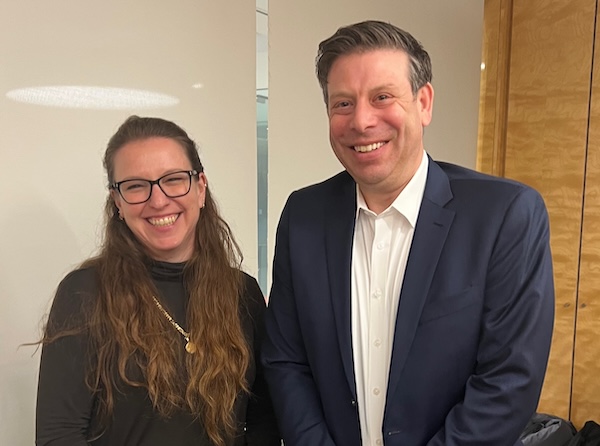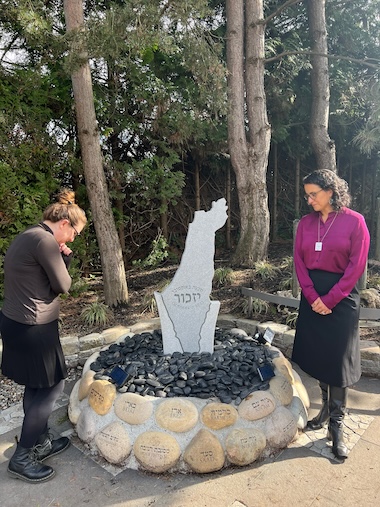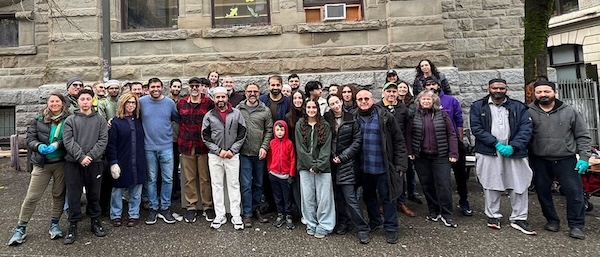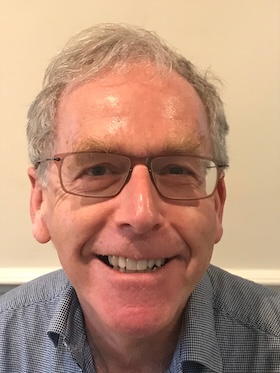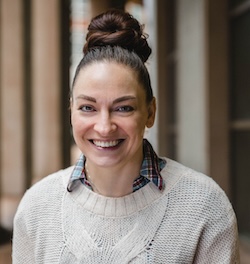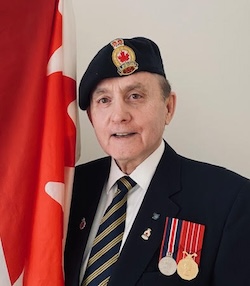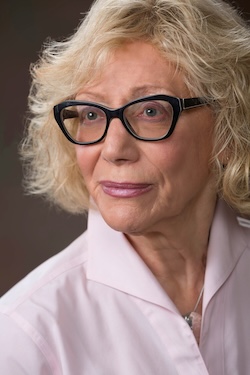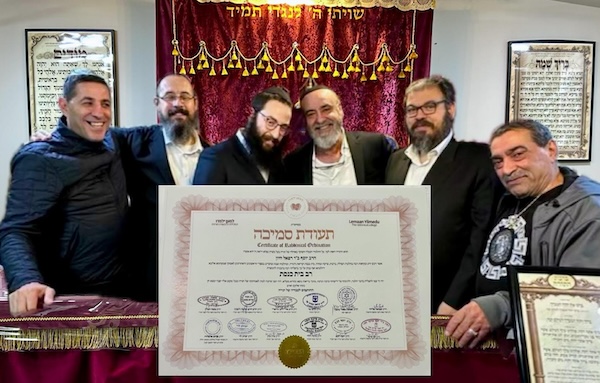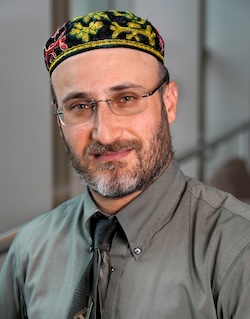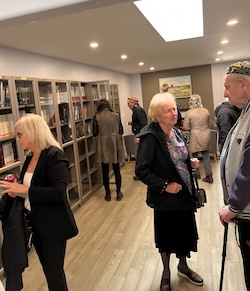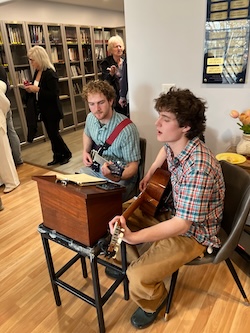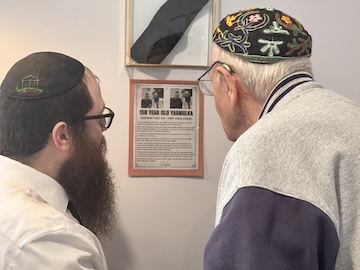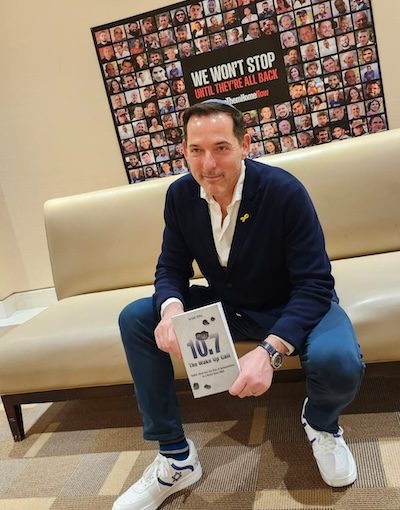Australian TV personality Erin Molan at Schara Tzedeck in Vancouver March 19. (photo by Pat Johnson)
Security was tighter than usual at Congregration Schara Tzedeck when Australian media personality Erin Molan spoke to Vancouver’s Jewish community March 19.
The non-Jewish commentator has become a lightning rod for anti-Israel activists since becoming a vocal voice in support of Zionism and Jews, particularly after Oct. 7, 2023. She is dumbfounded by the controversy.
“If you said to me two years ago, there’s going to be a terror attack, Hamas will slaughter 1,200 people, they will take hostages, they will burn children … you are going to come out very strongly and publicly and condemn those actions and you’re going to support the victims of those atrocities and that’s going to be controversial and you will be in the minority, I would have said you are dreaming, there is no chance in hell,” Molan told the audience. “But here we are.”
Since that October day, Molan has lost the four jobs she held in Australian journalism – her main gig as a commentator on Sky News Australia, a radio position, a column in Sydney’s Daily Telegraph and a regular magazine spot. Molan has not explicitly said she was fired for her pro-Israel views.
“Pure coincidence, of course,” was her response to a direct question put to her by Amir Epstein, executive director of Tafsik, the organization that brought her on a cross-Canada tour.
In February, she became host of 69 X Minutes, a news program conceived and funded by Elon Musk, which airs on X, the platform formerly known as Twitter.
Molan received a loud ovation for her comments on US President Donald Trump.
“You might love him, you might hate him,” she said. “Would I want him to marry my daughter? No. Do I think that in some ways he is the right person for this time given the alternative? Absolutely.”
She said Trump is shaking up a situation that demands new approaches.
“At least he’s throwing something different out there,” she said. “How many two-state solutions do you want to give the Palestinians? How many chances do you want to give? What are we up to, eight? Eight more chances for the same people that, at the last ceasefire, came on TV seconds after the ceasefire began and said, just FYI, we will do Oct. 7 again at the first available opportunity.
“You can’t keep doing the same thing,” she continued. “That’s insanity.”
Her assertion that Trump’s disruptive tactics are right for the time and place come in part from watching, she said, every second of available recorded footage from Oct. 7. Many of the perpetrators wore body cameras, in some cases livestreaming their attacks.
“I thought I understood how depraved they were, well prior,” she said. “I’d seen enough, I’d heard enough, I knew that they were probably as low as you could get. Watching the raw vision [recorded footage] gave me the next-level understanding of who you are dealing with and … I left there saying, there is no way you can coexist with those people.
“I watched a video of a dad jumping out of a window with a 4-year-old under his arm and then maybe a 6-year-old running beside him,” she recounted. “Just that fear on his face that … he knew that they were coming. He was not going to be able to do anything, but he was doing whatever he could. The terrorists killed him, then went to the fridge with two kids covered in blood, shaking, [having] just watched their dad killed and then pulling drinks out and they’re laughing. I watched their faces as they hacked the head off a young man. That, to me, is what I can’t ever forget, the joy that they derived in what they were doing. Two little girls and a little boy being burnt alive – they shot their parents and then they burnt them alive. I just don’t think you can keep pretending that this is just a dispute over land or this is just two countries that don’t really get along well. No, there are not two sides to this. They are evil, depraved, bloodthirsty murderers who will never, ever stop. So, whatever the solution is moving forward, it cannot have Hamas in existence at all and, from there, I don’t know, but I think you’ve got to try something different.”
Molan’s experiences with domestic partner violence have influenced her approach to the Oct. 7 attacks – and provided a contrast between the way she, as an Australian woman, is perceived differently from Israeli women.
“I was in a couple of very violent relationships that resulted in me being hospitalized a lot,” she said, noting that she shared the story for the first time publicly only a few months ago.
When Molan did so, she said, “all the feminists in Australia … were public and effusive in their sorrow and their praise for my bravery, for sharing.”
She said, “These were the same people who deny what happened to Israeli and Jewish women on Oct. 7, the same people who have not said a word about any of it. [They are] completely OK with Hamas raping, slaughtering, killing women.”
She experienced firsthand the very different reactions to her, “an Irish Catholic girl,” and to the rapes and murders of Israeli women, she said.
While she said everyone should be speaking up in support of Israel and against Hamas and global antisemitism, she had particularly harsh words for Islamic community members and leaders, not least because Islamic extremism hurts Muslims, she said.
“They should be at the forefront of this fight,” she said. “Where are they? That’s what’s really disappointed me in this space. There’s the odd one or two and they are incredible and they’re brave and they’re powerful, but … this was a perfect opportunity for [Muslim community organizations] to come out and say, ‘That’s not who we are, that doesn’t represent us or our religion.’ But, instead, they tried to downplay it, they tried to make it OK, they tried to normalize it.”
Molan has been critical of Canada’s now-former prime minister Justin Trudeau, as well as leaders in her own country and elsewhere, who she says have allowed the bar to be lowered on acceptable discourse.
She cited the example of a hate rally at the Sydney Opera House, hours after the atrocities in Israel, during which people expressed antisemitic chants and threats.
“If I were in power, if I were the leader of a nation and that had occurred on my watch, you could not have held me back in terms of what action I would have taken,” she said, adding that this was a moment when hateful and potentially violent people were gauging what would be accepted and what would not be accepted in society.
At that point, Molan said, leaders should have come down hard and police should have acknowledged that support for terrorism and incitement of violence against identifiable groups is illegal, freedom of speech notwithstanding. In Australia, Canada and elsewhere, she said, that did not happen.
She credited the Jewish community worldwide for their collective reactions to the challenges they face.
“You would be justified in being the most hateful people in history,” she said. “You would be justified in having hearts full of hate and no one could ever judge you for it. Every time you gather, all you say is, ‘Bring them home.’ That’s it. Every gathering I’ve seen of Jewish people since Oct. 7, the only focus there has been ‘Bring them home. Bring our people home.’ The other side, every gathering is ‘Intifada,’ ‘River to the sea,’ ‘Death to Jews.’ How can the world not see the stark difference between these two groups of people?”
Schara Tzedeck’s Rabbi Andrew Rosenblatt opened the event with a prayer for the hostages.
Mijal BenDori, vice-president, community planning, partnerships and innovation, of the Jewish Federation of Greater Vancouver, thanked the Vancouver Police Department, hired security and the community volunteer group Bitachon for keeping British Columbia’s Jews safe.
The event was co-sponsored by Federation, Schara Tzedeck and Tafsik, a new national organization that Epstein said targets “the Islamists, the Marxists, the communists, the keffiyeh Karens, the Jew-haters.”
His group, he said, has a number of projects in development, including an app to identify and remove anti-Jewish and anti-Israel hate graffiti; a group called LGBTJew, to provide a place for queer Zionists; and a support group for people who have been alienated by their Jewish families for their support of Israel.


